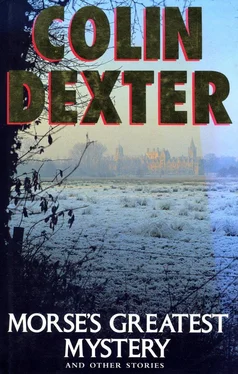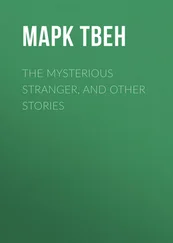— Boswell: owners of this strange orange-eyed breed? check with the Cat Society
— Publishers (OUP etc): any recent work known/ commissioned on Sir T W?
— Ante-natal clinics: check — esp. JR2
— Bird and Baby: check, with photograph
“We should come up with something , I agree, sir. But it’s going to take quite a while.”
“You think so?”
“Well, I mean, for a start, is there such a thing as the Cat Society?”
“That’s what you’re going to check up on, Lewis!”
“Seven lots of things to check up on, though.”
“Six!” Morse rose from his armchair, smiling happily once again. “I’ll check up on that last bit myself.”
“But where are you going to get a photo from?”
“Good point,” conceded Morse, allowing, in his mind, that occasionally it was perfectly acceptable to end a sentence with a preposition.
At 10:15 P.M. Lewis rang Morse’s home number, but received no reply. Was the great man still immersed in his self-imposed assignment — with or without a photograph?
In fact Morse was at that moment still sitting in the murder-room at 14 Jowett Place.
His mind had earlier informed him that he had missed something there; and at 8:15 P.M. he had re-entered the property, assuring the PC guarding the front door that he wouldn’t be all that long.
But nothing had clicked in that sad room. And the over-beered Morse had sat in the sole armchair there and fallen asleep — finally awakening half an hour after midnight, and feeling as rough (as they say) as a bear’s backside.
The following morning Lewis reported on his failures, Dixon’s failures, Palmer’s failures; and Morse reported on his own failures.
“You know this house business?” volunteered a rather subdued Lewis. “She’s very specific about it, isn’t she? Listed building, thatched, timbered, conservatory at the back — couldn’t we try the Council, some of the upmarket estate-agents...”
“Waste o’ time, I reckon.”
“So? What do we do next?”
“Perhaps we ought to look at things from the, er, the motivation angle.”
“Doesn’t sound much like you , sir.”
No, it wasn’t much like him — Morse knew that. He loved to have some juicy facts in front of him; and he’d never cared to peer too deeply down into the abyss of human consciousness. Yet there now seemed no alternative but to erect some sort of psychological scaffolding around Sheila Poster’s hopes and fears, her motives and mistakes... And only then to look in turn once more through each of the windows; once more to ask what the murdered woman was trying to tell everyone — trying to tell herself — in the story she had written.
Morse sought to put his inchoate thoughts into words whilst Sergeant Lewis sat opposite and listened. Dubiously.
“Let’s assume she’s had a fairly permanent job in the past — well, we know she has — but she’s been made redundant — she’s got hardly any money — everything she owns is just that bit cheap — she meets some fellow — falls for him — he’s married — but he promises to take her where the lemon trees bloom — she believes him — she carelessly gets herself pregnant — by chance she finds an advert his wife has put in the local rag — she goes to work there — she’s curious about the wife — jealous about her — she wants the whole situation out in the open — things turn sour though — lover-boy has second thoughts — he jilts her — the wife gives her the sack into the bargain — and our girl is soon nourishing a hatred for both of them — she wants to destroy both of them — but she can’t really bring herself to destroy the father of her child — so in her story she changes things a bit — and sticks the wife in bed with a lover of her own — because then her own lover, Sheila’s lover, will still be around, still alive — so there’ll always be the chance of her winning him back — but he’s bored with her — there’s some academic preferment in the offing perhaps — he wants to get rid of her for good — he’s prepared to play the faithful husband again — but Sheila won’t play ball — she threatens to expose him — and when he goes to see her she becomes hysterical — he sees red — he sees all the colours of the rainbow — including orange, Lewis — because he knows she can ruin everything — will ruin everything — and then he knifes her...”
“Who knifes her?” asked Lewis quietly.
Morse shook his head. “I haven’t the faintest idea. I know what, though. I know I’m missing something!”
For a few moments the look on Morse’s face was potentially belligerent — like that of Boswell in the story; and Lewis felt diffident about asking the favour.
Yet his wife had insisted that he did.
“I hope you won’t mind, sir, but if I could take a couple of hours off this lunchtime? The wife—”
Morse’s eyebrows rose. “Doesn’t she know you’re in the middle of a murder enquiry? What’s she want you to do? Take her a bag of spuds home?”
Lewis hesitated: “It’s just that, well, there’s this great big crack that’s appeared overnight in the kitchen wall and the wife’s worried stiff that if we don’t—”
“Bit of subsidence, you reckon?” (The pedantic Morse gave the stress to the first of the three syllables.)
“More like an earthquake, sir.”
For several seconds Morse sat utterly immobile in his chair, as if petrified before the sight of the Gorgon. And for the same several seconds Lewis wondered if his chief had suffered some facial paralysis.
Then Morse’s lips slowly parted in a beatific smile. “Lewis, my old friend, you’ve done it again! You’ve gone-and-done-it-once-again! I think I see it. Yes, I think I see all of it!”
The happily bewildered Lewis sat back to learn the nature of his latest involuntary feat; but any enlightenment would have to wait awhile — that much was clear.
“Don’t you let that missus of yours down!” beamed Morse. “She’s one in a million, remember that! Get off and sort things out with the surveyor or something—”
“Or the demolition squad.”
“—and get back here” (Morse looked at his watch) “two o’clock, say?”
“You’re sure—?”
“Absolutely. I’ve got a few important things to do here. And, er, just ask Dixon to come in, will you? And Palmer, if he’s there?”
Lewis’s euphoria was dissipating rapidly; but he had no opportunity to remonstrate, for Morse had already dialled a number and was asking if he was through to the Atlas Department of the Oxford University Press.
Sergeant Lewis returned to Kidlington HQ just before 2 P.M., almost three hours later, having finally received some reasonable reassurance that the Lewis residence was in minimal danger of imminent collapse. And at least Mrs . Lewis was now somewhat happier in her mind.
It soon became apparent to Lewis that during his absence someone — the doughnut-addicted Dixon? the pea-brained Palmer? — had been back out to Jowett Place; and Morse himself (what else had he been up to?) now sat purring like some cream-crammed orange-eyed longhair as he surveyed the evidence before him on his desk — ready, it appeared, to lead the way along the path of true enlightenment.
“Clue Number One.” Morse opened the magnum opus of Diogenes Small and lovingly contemplated the bookmark: “Greetings from Erzincan.” “All right, Lewis?”
“Clue Number Two.” He held up the postcard from Tashkent, turned it over, and read out its brief message once more:” “Travelling C 250 K E.” Not too bright, were we? It means exactly what it says: Travelling about two hundred and fifty kilometres east, east of Tashkent, where we find, Lewis — the Susamyr Valley in Kirgyzstan.
Читать дальше












